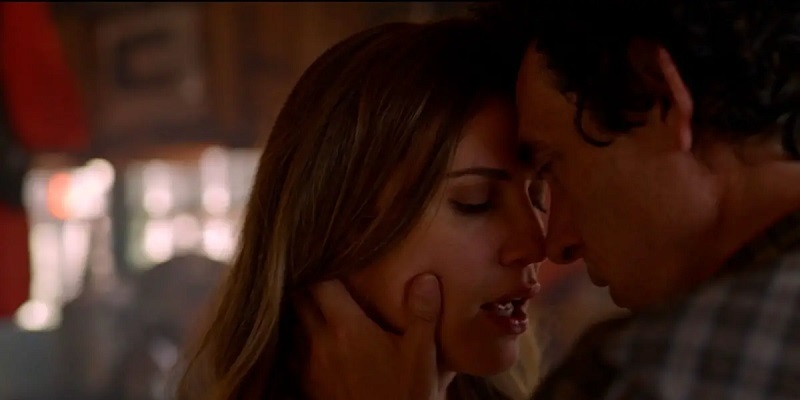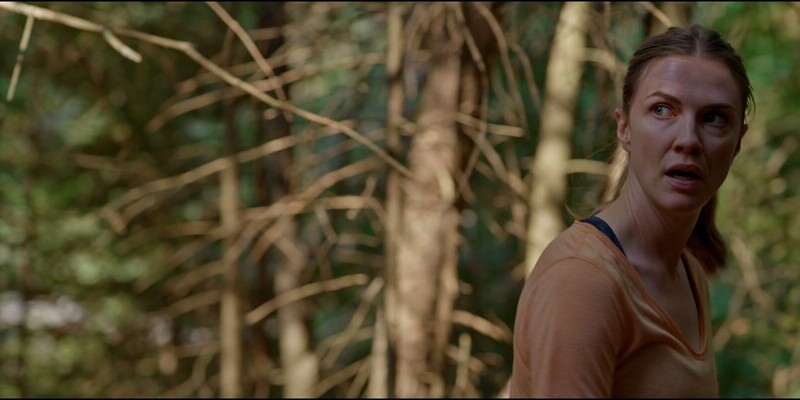
Review by
Eric Hillis
Directed by: Sean Garrity
Starring: Jonas Chernick, Sara Canning, Tanisha Thammavongsa, Joe Pingue, Natalie Jane, Christian Meer

Mumblecore didn't die, it just emigrated to Canada. In recent years a
distinctive indie scene has emerged north of the 49th Parallel,
increasingly centred around actor/writer/producer Jonas Chernick.
Penned by Chernick and co-writer Diana Frances and directed by
Sean Garrity, The Burning Season takes its cues
from a classic of Canadian indie cinema, Atom Egoyan's
The Sweet Hereafter, by unspooling its narrative in reverse chronological order. Though in
retracing the steps of a doomed relationship, it has more in common with
Francois Ozon's 5x2.
The film opens with a prologue that is simultaneously a flashback and a
flash forward. Two panicked teenagers stand before a burning cabin. "You
can't ever tell anyone about this," the girl, Alena (Natalie Jane), pleads. The boy, Benny (Christian Meer) agrees, though he's
clearly distressed.

We then cut to 25 years from this event, to the first of seven chapters
that will work their way back to this prologue. It's the wedding day of
Benny, who now goes under the name JB (played by Chernick), and Poppy
(Tanisha Thammavongsa), the mother of his infant child. When
Alena (played as an adult by Sara Canning) arrives with her
husband Tom (Joe Pingue), JB is immediately unsettled by her
presence. "Why did you come?" he asks. "Why did you invite me?" she
indignantly replies. To cope with the stress, JB hits the coke, causing
a scene during the nuptials and getting into a scrap with Tom, who
suddenly sees in JB and Alena's eyes that he's been betrayed.
Each subsequent chapter takes us back a year to the two week period of
every summer that Alena and Tom stay in one of the rental cabins owned
and managed by JB. Each summer JB and Alena vow not to act on their
desires, but they always end up engaging in secret sex sessions in the
woods. As we edge closer to that prologue we learn a little bit more
about what JB/Benny and Alena went through as teens, and why they've
been bonded by a mix of trauma and mutual desire ever since. We learn
perhaps a little too much, which makes the final act, i.e. the prologue,
a tad underwhelming in its lack of an mpactful reveal.

With its repetition of a single scenario over several scenes,
The Burning Season could have fallen into the trap that
ensnares many films that adopt a Groundhog Day narrative,
that of making the audience sit through the same scenes with little
variation. That each new chapter feels fresh here is largely down to the
talents of Chernick and Canning, whose performances keep us invested in
the story of JB and Alena. Both Chernick and Canning are as adept with
comedy as drama, which makes them naturals for
The Burning Season's tragi-comic demands. We know JB and Alena really need to move on and
avoid one another, but at the same time we find them charming together,
none more so than a comic relief moment involving a bat that plays like
a homage to Annie Hall's lobster scene. Chernick is blessed with features that are both
hangdog and handsome, allowing him to switch quickly from the
charismatic man Alena can't stay away from to the troubled soul she has
clearly inflicted a life of trauma upon. Canning is very good at playing
women who exude a tough shell but are crumbling on the inside, making
her perfect for the role of Alena, who spends the movie convincing
herself she's in control when she's clearly a mess.
Jane and Meer are equally excellent as the teenage Alena and Benny. I
don't know if the adult scenes were shot first, allowing the younger
stars to study Chernick and Canning, but it certainly feels like that
was the case. Jane and Meer nail the distinctive mannerisms of the older
actors, though they avoid mere impersonations.

Any movie that employs a reverse chronology prompts the question of
whether such an approach is vital or simply a gimmick. I'm not entirely
convinced that The Burning Season would lose anything in
storytelling terms if it played its drama in chronological order, but it
would likely be far less interesting to observe the performances of two
actors doing a fine job of peeling away the layers of their
characters.


